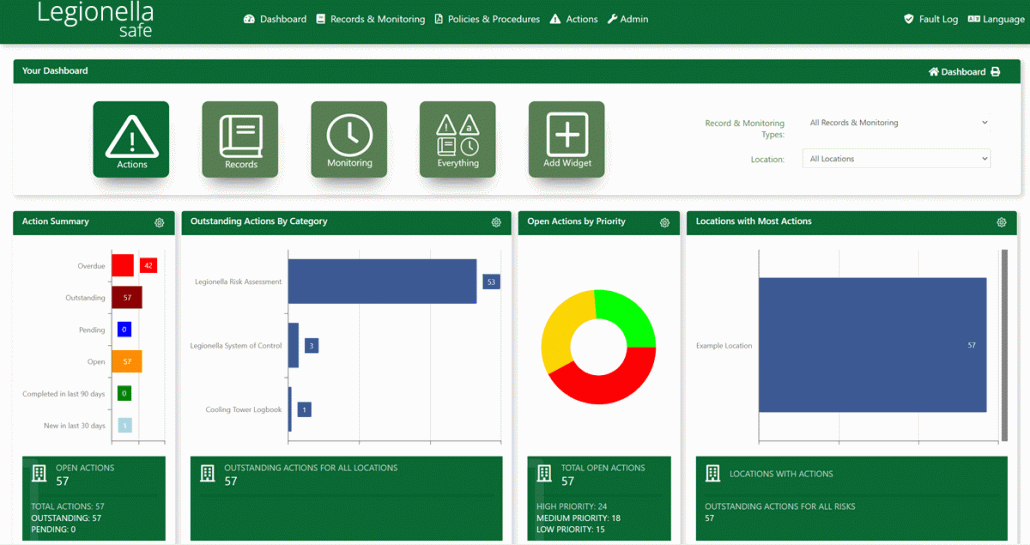How a Water Safety Audit Can Keep Your Business Legally Compliant
 In this review the water safety compliance specialists at Legionella Control International highlight the benefits of a water safety audit and how it can both improve workplace safety and keep businesses compliant with the law.
In this review the water safety compliance specialists at Legionella Control International highlight the benefits of a water safety audit and how it can both improve workplace safety and keep businesses compliant with the law.
The article explains what a water safety audit is and how it can improve regulatory compliance and the management of workplace safety. It then goes on to highlight the 4 key stages of this type of audit… (1) the evaluation of water management policies, (2) review of Legionella risk assessments, (3) procedures in place to control and monitor Legionella, and (4) detailed records management.
A version of this article looking at the benefits of a water safety audit and how it can help keep businesses compliant with health and safety law first appeared in Legionella Control International’s newsletter. To get it in your inbox, sign up for free here.
What are the benefits of auditing water safety management processes?
Most of us would agree that the word audit has the power to send a shiver down the spine. However, a water safety audit can make the difference between failing to comply with legislation regarding water safety and ensuring your business meets and exceeds all requirements.
Health and safety law is designed to make all workplaces as safe as possible. This extends to building water safety too. While there are differences in approach for healthcare settings and those which do not have any connection to healthcare, adherence to the law is always of paramount importance.
Here, we’ll look at how a Legionella or water safety audit is the best way to review a current water safety scheme, and to ensure it is having the desired results.
What is a water safety audit?
A water safety audit is a systematic review of an organizations water management processes and procedures to evaluate their reliability, efficiency, and effectiveness. It can be performed internally, but is best carried out by an independent expert to avoid conflicts of interest and to ensure the integrity of the audit.
Why opt for an independent water safety audit?
An independent water safety audit is typically conducted by an experienced water specialist or an Authorising Engineer (Water). They are qualified and experienced in auditing water safety management plans and processes. These typically are the control schemes that businesses have in place that are intended to maintain a safe water system and supply on site.

There are several ways you can audit your water safety plans and processes, but an independent audit has advantages over any other method you might use. For example, an independent Authorising Engineer (Water) will have no prior experience of your business or organisation. They will therefore possess no bias that could influence the outcome of the audit.
Four key areas a water safety audit should cover
We’ll go through these 4 areas in turn and explore how an auditor, an Authorising Engineer (Water) can conduct an independent audit focusing on each of them in turn.
1: Evaluating water management policies
The water management policies form the backdrop for managing any water system to maintain regulatory compliance and keep people safe. The policy should indicate management processes, along with putting arrangements in place to ensure the water system is always safe and meets all legal requirements.
Ideally, the policy will be comprehensive and cover the roles and responsibilities taken on by individual workers or management. There should be a clear understanding of who is responsible for which roles and processes, while also covering training processes.
Those involved in the policy and water safety plan should receive Legionella training, to ensure they understand their role, responsibilities, the risks and how they can be identified in the water system. Competency is a key requirement here, along with the clear identification of the Duty Holder, Responsible Person and Authorised Persons involved in maintaining the water safety plan.
An independent water safety assessor can examine whether anything has been missed or if anything can be improved upon.

2: Examining Legionella risk assessments
Legionella or water safety assessments are required by law to identify potential risk factors inherent with a water system. An audit will note when the last risk assessment took place, what facilities it covered, who conducted, and whether it was conducted within the rules and regulations laid down to cover these procedures.
It is not enough to carry out a Legionella risk assessment. Those involved in completing the assessment should be properly trained and experienced enough to do so properly. An audit can advise whether any improvements can be made and confirm whether the risk assessments have indeed met all current legal requirements.
3: Evaluating procedures used to control and monitor Legionella bacteria
The Health and Safety Executive ACOP L8, technical guidance HSG274 Parts 1, 2, and 3, and the Department of Health HTM 04-01 cover the safe management of water systems, providing ample guidance on how to maintain both hot and cold water systems. Maintaining safe water temperatures for hot and cold water are a key part of minimising any risk of bacterial growth throughout the system.
Regular monitoring ensures hot and cold water temperatures are maintained at acceptable levels, and that any bacteria in the water is kept at safe levels. An audit will check these factors, while also confirming that any testing or monitoring is done at suitable intervals.
The risk assessment should identify when flushing is required, for example, and how often it should be done. Infrequently used outlets should become part of a flushing programme. Meanwhile, thermostatic mixing valves (TMVs) should be installed on any outlets used by individuals who are at risk of scalding from hot water. An alternative approach to achieving safe control is to chemically treat the water system at regular intervals to prevent the growth of bacteria.
A water safety audit will cover all these elements, ensuring that everything is done as it should be, and nothing is missed.
4: Maintaining Legionella logbooks and other key records
All pertinent data relating to water safety, Legionella, testing, other processes and the details and competence of key staff should be recorded and kept, proving what has been done and when. The audit carried out by an independent Authorising Engineer (Water) will check whether the logbooks are a complete and accurate source of information regarding the water management system in place.
Ideally, all information will be present and correct, and nothing will be missed. However, if the audit identifies a lack of information at any point, this will be highlighted so changes can be made to record things with accuracy in future.

The benefits of choosing an independent water safety audit
The best way to look at the audit process is to view it as a tool to ensure you are meeting all the legal requirements revolving around water safety. An independent assessor will have no prior knowledge of the system, the people involved or the way things are done. Therefore, they can easily identify any gaps in the processes completed or records kept.
Some people and organisations are wary of this type of annual audit, and yet it is one of the best tools they can use to ensure their water safety planning and processes are always meeting or exceeding the legal requirements. It is far better for an auditor to point out any issues, so they can be corrected in a timely manner. Compare this to the alternative, where formal intervention from a regulator may involve contravention notices, cost recovery, fines and more. This approach makes the water safety plan even more robust and reduces the chances of any mistakes or Legionnaires’ disease outbreaks becoming more likely.
Of course, following the first annual audit, the organisation will follow all the advice given, ensuring the water safety processes and procedures in place will be even stronger for the coming year. As such, the independent audit is a protective tool that will ensure the water safety within a building or organisation is as safe as it should be.
World leading water safety management specialists
The water safety specialists at Legionella Control International help business owners and those responsible for the control of Legionella and other waterborne pathogens manage their workplace risks to maintain regulatory compliance and keep people safe.
We are experienced water safety specialists and deliver full range of services including independent auditing for water safety compliance. We also offer Authorising Engineer support, risk assessments, water quality testing, City & Guilds training and other health and safety risk management services that help keep businesses compliant with the law and workers and others safe.
If you would like to speak with one of our water safety specialists about your water management processes and procedures call us today on 0330 223 36 86 or contact us here …


